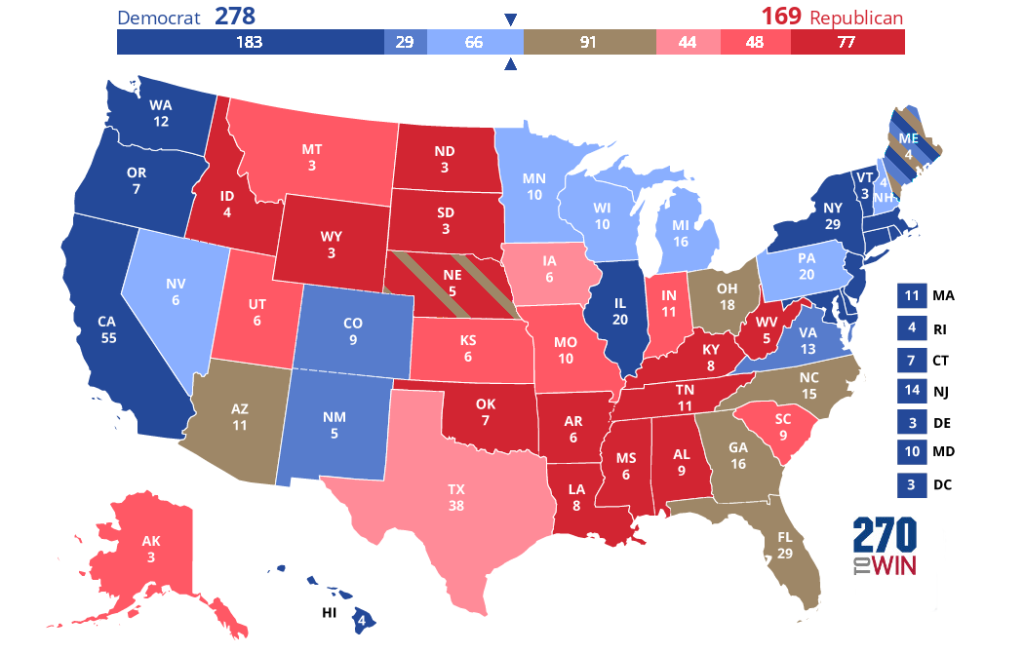What if Trump loses by six million votes but wins the Electoral College?

Update: Here’s some interesting empirical analyses of the relevant probabilities of an inverted election, from Dean Spears et. al. at UT-Austin.
When I was a wee lad, it was taken for granted that a presidential candidate winning the election without winning even plurality of the actual vote would be a Really Bad Thing, and quite possibly even a full-blown constitutional crisis. But it hadn’t happened in modern times, and we kept getting lucky. For example it easily could have happened in 1960, 1968, and 1976. (1976 was a particularly stark example. Carter got nearly two million more votes than Ford, but if Ronald Reagan had campaigned a bit for Ford in Texas and Mississippi and flipped a few tens of thousands of votes in those states Ford would have won the EC).
Then of course we got 2000. Somehow, all the argument over the Florida vote seemed to obscure that W had gotten less votes nationwide, period. Not talking about that became part of the whole elite media consensus that there should be no more talk about the legitimacy of the 2000 election, especially after 9/11.
Then in 2004 we basically had a repeat of 1976. Kerry lost the vote by three million, but reversing a few tens of thousands of ballots in the Worst State Ever would have won him the election.
I have a more than sneaking suspicion that, if that had actually happened, the absurdity of the Electoral College would have all of a sudden become a truly pressing national issue. I mean a man who lost the white vote by sixteen million ballots would have become president, even though he didn’t even win enough votes from the Others to come close to overcoming that gigantic margin! I’m pretty sure if something like that had happened we wouldn’t have been hearing too much about the Wisdom of the Framers and It’s a Republic Not a Democracy.
But that didn’t happen, so everything was still A-OK. The next two presidential elections went by without a similar dynamic arising, so in a culture with the attention span of a fruit fly the whole topic just pretty much disappeared completely again.
Finally . . . 2016. The combination of “electing” an impossibly corrupt imbecilic authoritarian freak show of a human being, even though he got nearly three million fewer votes than the first woman to be a major presidential candidate, was finally too much for a lot of people, even in the cesspool of reactionary centrism that has been our elite media for so many years.
The elite consensus of my tender years — that becoming president even though you got millions of fewer votes than another candidate was actually a terrible, unacceptable thing — didn’t suddenly become the consensus again or anything, but at least it once again became a respectable point of view.
Which brings us to:
Let’s contemplate what “loses the popular vote by four” would mean. Trende is no doubt correct that Trump losing the “popular vote” by “only” four percentage points would give Trump a good shot at remaining president.
We need to make just a couple of very plausible assumptions — turnout will be a bit higher in 2020 than 2016, despite COVID, and the third party wank vote, which drew in seven million Americans the last time around, will be comparatively negligible this time — to turn a four-percentage point loss of the vote into six million more Americans voting for Biden than for Trump.
By the way, this should be referred to always as “the vote,” not “the popular vote.” The Electoral College isn’t a separate vote: it merely funnels the actual vote through the white supremacy maintenance machine that makes a Wyoming voter’s vote 288% more valuable than a Californian voter’s vote in the race for the presidency.
We can also ignore arguments that the national vote would have been significantly different in 2016 or whenever if the Electoral College didn’t exist. For instance, while it’s true Trump didn’t campaign much in California, neither did Clinton, for the very same reason. Trump lost the presidential vote by millions, period.
And here we get to what should be a shocking fact, even though we’re inured to it by inertia and the reactionary ideology that every American is taught from birth about the magical properties of our political system.
Donald Trump is going to lose the 2020 presidential election by millions of votes.
This isn’t speculation: it is known. Everyone acknowledges that Trump has no chance of winning the vote. It would be a monumental surprise if he loses the vote by “only” two million voters. But if he loses by “only” two million voters — think for a moment about what two million people actually means — he is almost certain to “win” the presidency again.
In what world is this acceptable, even if you leave aside the unique horribleness of Donald Trump himself? The answer is that it isn’t.
The National Popular Vote Compact is a simple legal fix for the monstrous kludge that the Electoral College has become. Enacting it should be a top priority within the top priority that electoral reform in general needs to be for America’s one remaining non-fascist major political party.
